Artificial Intelligence has managed to alter the shape of many industries in the world. The appearance of automated hotels in China, such as Alibaba’s Future hotel, a robotized hotel, is redefining the future of the hotel industry. The use of AI in hospitality in China is creating high-tech hotels that lower management costs and improve efficiency, replacing manual work with systems and robots. Facial recognition check-in in hotels is becoming a reality in China, and the use of AI-powered computers that mine data provide tailored customer experiences.
How has artificial intelligence been utilized in the hotel industry in China? How do technology-driven consumers perceive high-tech hotels in China? How can AI improve the guest’s experience in the Chinese market? What AI companies are developing technology that will be used in future smart hotels in China?
A new stage in the development of China’s tourism and hotel industry: AI disrupts guests’ experience, in a good way!
Alibaba’s Future hotel FlyZoo, a unique robotized hotel in China
Alibaba, known mainly for being the e-commerce and technology giant in China, opened its first robotized hotel in December 2018, the FlyZoo Hotel. The Alibaba Future Hotel in Hangzhou was built by Fliggy, Alibaba’s online travel platform, along with other business units such as Alibaba A.I. Labs and Alibaba Cloud.
The main objective of this high-tech hotel is to demonstrate that artificial intelligence is already transforming China’s Hospitality Industry and that it will inspire the tourism and hotel industry in China and around the world to embrace innovation.
Wang Qun, CEO of FlyZoo Hotel, repeatedly said in many interviews that they would continue to create ‘smart brains’ for automated hotels in China, as well as more customized experiences for guests.
4 AI digital innovations in FlyZoo Hotel
Facial recognition
FlyZoo is equipt with a facial recognition check-in system. On the way to the room, the elevator recognizes the customer and identifies the floor of their room. The room door opens without the use of magnetic cards or keys. All this, thanks to facial recognition technology. As China’s largest R&D spender, Alibaba is the largest single investor in SenseTime; an AI start-up known for its facial recognition technology.
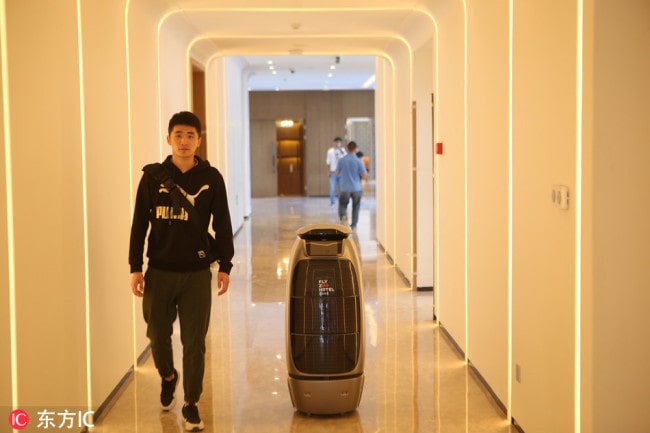
The vocal assistance of Tmall Genie
At the Alibaba Future Hotel, the 290 rooms are equipped with the vocal assistant Tmall Genie, who obeys all the guest’s orders by voice, whether it is to dim the lights, change the temperature, open or close the curtains, turn on the television or even order food.
The robot
The one-meter high robot activated by Tmall acts as a concierge, accompanying the guests to their room, providing room service, doing laundry, and even acting as a waiter in the hotel restaurant. At the bar, the bartender is a robotic arm that can produce more than 20 different cocktail mixes.
Buy and pay with a click
Customers begin their adventure at the Alibaba Future Hotel by booking exclusively online through Alibaba’s Fliggy App (Alibaba’s online travel agency). When booking the room, travelers can also choose all the features that allow them to customize their trip as much as possible: the type of room, its location in the hotel, the orientation, and direction of sunlight.
Like all Alibaba products, the Hotel of the Future also offers the possibility to shop online. Guests can buy anything they see in the hotel, such as the decorative products, using the FlyZoo purchase application. The check-out and all payments are made with a simple click on Alipay.
China’s Hospitality industry: International hotel chains install AI technology when joining giants Alibaba and Baidu
Marriott International
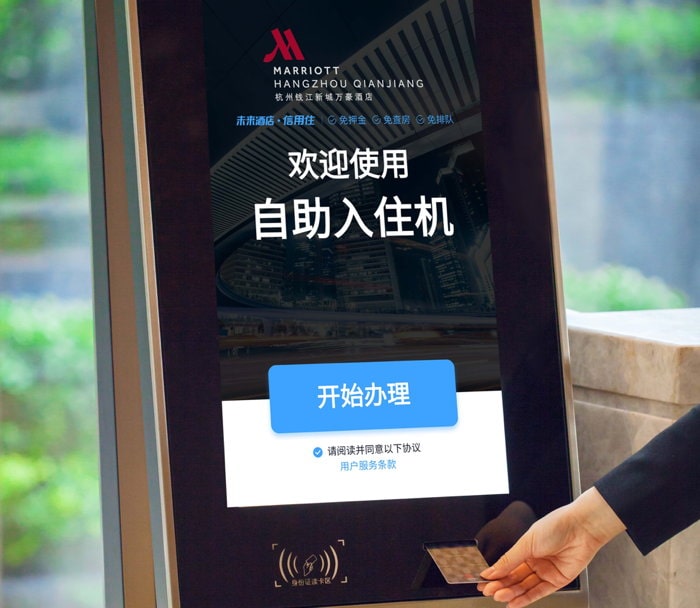
International hotel chains are also transforming into high-tech hotels in China. For instance, introducing Figgy’s facial recognition check-ins the application powered by Alibaba in the Hangzhou and Sanya locations of the Marriott International Group. Alibaba plays an important role in the implementation of AI technology in the hotel industry in China, this time partnering with international hotel brands. Founded in August 2017, the joint venture of Marriott International and Alibaba Group is an innovative digital travel service and consulting company that aims to launch AI technology in the hospitality industry. Alibaba’s goal is to revolutionize the hotel experience selling high-tech solutions, thus leading China’s hospitality industry into the future.
This initiative appears to be successful, as joining Alibaba means also benefiting from its capacity to engage customers and create networks. From the news section on Marriot International’s official website, “along with digital enhancements, Marriott International has also witnessed a significant growth of over two million loyalty members as of June 2018. Enabled by the joint venture, members can now link their Marriott Rewards and Fliggy memberships through status matching, earn points, and enjoy benefits from both programs”.
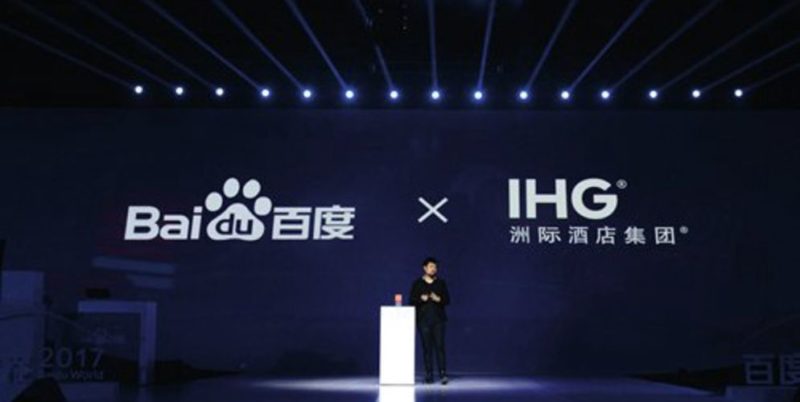
InterContinental Hotel & Resorts
Similarly, the InterContinental Hotel & Resorts Group (IHG) has teamed up with Alibaba’s competitor Baidu to enter the high-tech hotel generation and pioneer the introduction of AI in hospitality in China. By developing “Smart rooms” with artificial intelligence in its Beijing and Guangzhou hotels, the aim is to redefine the customer experience in China’s hospitality industry.
The Baidu DuerOs platform integrates AI technology into the Smart Rooms through voice control devices. For example, guests can choose the ambiance of their rooms between work or leisure mode. By offering an increasingly personalized experience, based on customers’ choices, the circulating information allows the management system to fine-tune guests’ tastes and expectations.
Want to learn more about the development of artificial intelligence in China? We got you covered, download our AI in China White Paper.
In addition to the use of robots to automate service and concierge tasks, AI in Chinese hotels has also been introduced by the dissemination of data allowing to automatically define the profile of the consumer and thus offer customized and personalized experiences. Artificial intelligence brings the service or product closer to the consumer, in a country of millions of inhabitants where the possibilities of consumption are infinite. Using the preferences of the clients, stored during previous trips, AI technology automatically offers prepares hotel room for the client anticipating their preferences, offer a higher output quality than when relying only on human effort.
Are consumers receptive to automated in China’s hotels?
China, where data sharing and facial recognition are well integrated
AI in automated hotels in China offers a high-quality personalized service to its guests, and it is possible thanks to the circulation of data that refines the profiles and preferences of clientele. The dependence on smartphones makes it possible to store deep reserves of consumer data that hotels use to study and access the needs of potential customers.
In China, there is a massive data network that circulates between companies and state institutions to locate and watch the country’s inhabitants’ lives, among other uses. Chinese upper-class leisure travelers are favorable to the diffusion of their data and accept more easily to share information on their hobbies, their profile on social media, photos, job, and geolocation. On a survey realized by Mazars, 97% of Chinese travelers were willing to share at least one piece of personal information against 80% of Western travelers. The integration of AI in the tourism and travel industry in China is easier than elsewhere.
Facial recognition check-in in hotels in China is just another example of the spread of AI-technology across Chinese industries: facial recognition is used by banks, financial institutions, airports, restaurants, many Chinese start-ups, mobile apps, and the government. On a Washington Post’ report in 2018, an inhabitant from Chong Qing stated that the facial recognition camera that allows access to her apartment is a useful convenience: “If I am carrying shopping bags in both hands, I just have to look ahead and the door swings open,” she said. “And my 5-year-old daughter can just look up at the camera and get in. It’s good for kids because they often lose their keys.” Personalized services driven by AI technology have become a priority for Chinese travelers.
A fascination with AI and modern technology
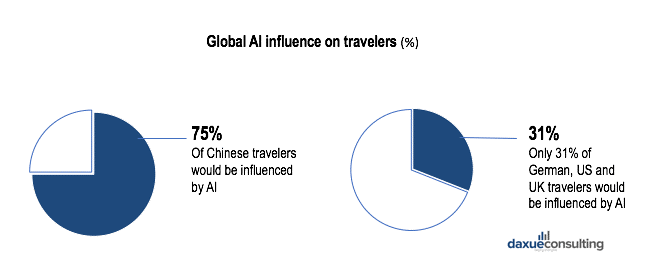
Chinese consumers, especially from new generations and increasingly the growing middle class of Tier 3 and Tier 4 cities, are attracted to virtually everything tech-related. The notion of artificial intelligence is much more deeply rooted in the Chinese mindset than in the Western’s.
Exposure to futuristic products or experiences is a real pleasure for today’s Chinese population. High-tech hotels in China represent not only a step forward in comfort and modernity, but also an attraction. With growth in China’s smart home appliances, guests would look for the same level of comfort and automatization during their stay in hotels than at home.
Chinese consumers also prefer interacting less with humans, as technology improves. The FlyZoo Hotel is robotized in all the tasks facing the public, but not in those behind such as the kitchen and cleaning services. The robots are part of Alibaba’s devices to combine high-tech with reduced personnel costs, eliminating the need for guests to interact with other people.
Consumer comfort levels with mobile payment in China
Another attractive feature of implementing AI in hospitality in China is online payment and purchasing. With 583 million people using mobile payment transactions in China in 2018 and still growing, online check-out and payment in hotels are bound to be the first innovation in hotels that haven’t implemented it yet. Some hotels in the US and Europe, such as the Landmark in London are already launching WeChat Pay and Alipay systems.
China is a mobile-first market, which greatly contributes to the success of online payment. Another reason is that mobile payments are powered by the strongest technology players in China: Alipay, the main payment method belongs to Alibaba Group. On the other hand, WeChat Pay belongs to Tencent, and the almost 1 billion users of WeChat in China prove its popularity.
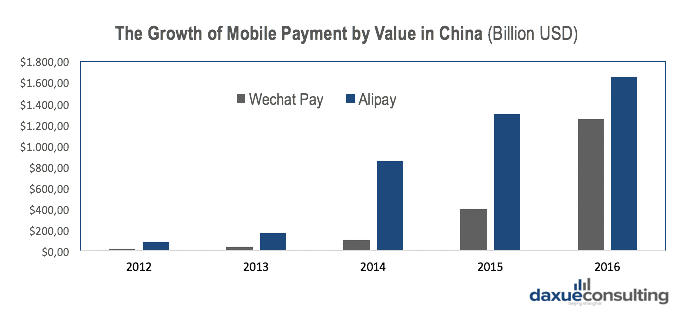
Could high-tech in hotels in China affect human resources?
In a study conducted by PwC, 21%existing jobs in China’s service sector could be displaced over the next 20 years. However, it is estimated that there could be a 50% growth in jobs created by AI and related technology over the next 20 years.
With AI solutions in the hotel industry in China, it is possible to cover consumer assistance throughout the booking process, and problem-solving during the guests’ stay, therefore reducing the human labor factor. Most guest requests can be handled automatically by AI-enabled response technology in hotels, resulting in savings in time and costs, and an increase in guests’ engagement with the brand.
In the official Marriott International website, Mr. Henry Lee, Managing Director of Marriott International Greater China states that “with technology, our hotel associates can work more efficiently to do what they do best – delivering personalized service to our guests.”
Therefore, in China’s robotized hotels, both basic and repetitive functions, as well as complex problem solving for involving customer interactions, can be carried out without the need for human contact. Still, even Alibaba’s FlyZoo Hotel, the most robotized hotel in China, has a human guest service workers, who are free from mechanical and tedious tasks and can focus on the human side of service.
AI in the hospitality industry in China: Artificial Intelligence meets tourism trends to deliver the best guest experience
A new Chinese tourist profile
China’s tourism sector continues to grow. In 2018, travel and tourism contribution to China’s GDP had amounted to 1,509 billion USD with spending mostly coming from domestic consumers; leisure travel accounted for of 81.4% of total versus business travel accounting for 18.6%. Chinese consumers travel mainly for leisure, and with a motivation to reaffirm their status, vis-à-vis others by publishing their travel experience on social networks.
With the rise of the traveling middle class, new profiles of Chinese tourists are defined, and the hotel industry will not stop growing. Travelers increasingly demand standards, finer things. Thus a new kind of traveler arises: the free independent travelers (FIT).

The FIT travelers
Free Independent travelers are young, well-educated, and relatively affluent. The FIT use all types of electronic devices that will allow them to travel more comfortably. Smartphones are the FIT’s travel planner, tourist guide, means of payment, and communication with their peers. FIT are tech-savvy consumers that drive growth for most technology innovations and make a potential guest of high-tech hotels in China. By using AI and intelligent devices in the hotel, valuable personal data is also collected form the traveler. On a survey conducted by Mazars Consulting and YouGov, some of the results imply that “Chinese travelers are indeed looking for comfort and convenience more than other countries surveyed. Armed with this data, AI algorithms can determine the clients’ habits, either to lure them back by offering a tailor-made experience or to sell them additional products”.
The increasingly connected Chinese travelers
Planning the trip beforehand
Independent travelers are willing to spend more but at the same time, are more demanding. The new generation of Chinese travelers, especially Y generation and millennials, are known for thoroughly planning their trips ahead of time, to find the option that best suits their expectations. Millennials’ spending accounts for 65% of total consumption growth, becoming a group of people with the power of reshaping China and the world. The vast majority use social networks and travel agencies to assess their alternatives, in addition to relying heavily on references from other customers.
ATKearny’s consumer study on the segmentation of the Chinese tourism market observes that 70% of travelers use online travel sites for gathering information, with 58% booking accommodation on sites such as Ctrip or Qunar. Online tour operators rely heavily on content gathered on user experience.
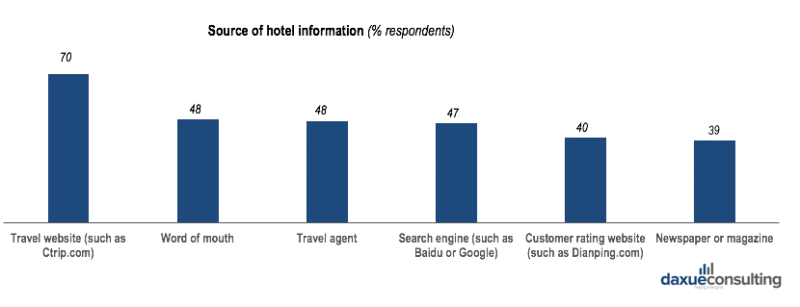
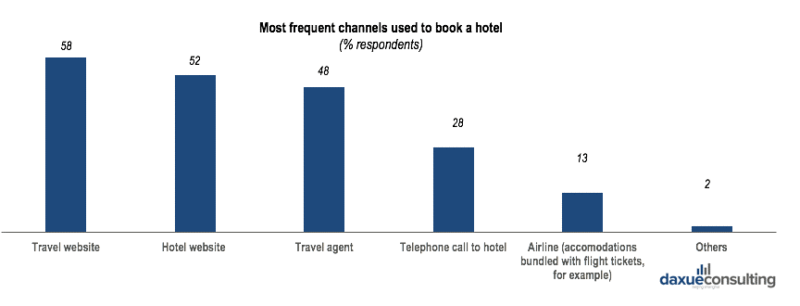
In addition, travelers do exclusively use websites dedicated only to travel. It is increasingly common to find travel products on China’s giant e-commerce platforms such as Taobao, and social networks such as WeChat. Through Wechat, hotels can create brand awareness and communicate their services. Similarly, in addition to chat messaging, WeChat also has chatbots and mini-programs, where hotels can add e-commerce and booking functions.
How can the hotel industry in China benefit from data mining-powered by AI technology?
Personalized services are a reality in almost every consumer goods and services industry, and is a reality in the hotel industry in China. Travelers are looking for tailor-made experiences, services tailored to their expectations and tastes. Some hotel brands are using technology and social media to get as close to the consumer as possible. The collection of personal and behavioral data during the hotel stay are extremely useful when defining the consumer’s profile and presenting offers related to the hotel industry or offers to buy products.
Technology giants Baidu, Alibaba, and Tencent are investing millions in AI, developing powerful databases that bring the offer closer to the consumer in an increasingly accurate manner. Tencent runs Wechat, which has access to more than 1 billion users on its platform, Baidu is the largest search service in China, and Alibaba is the largest e-commerce platform. These three companies have access to an infinite amount of information that allows data mining to define consumer demand. By launching AI technology in hotels in China, the technology giants can easily approach the traveler and meet his/her expectations and desires, changing the hotel industry dynamics. Demanding travelers would spend less time looking for the perfect fit, and almost tailored-made offers would be presented to them.
AI in hospitality in China AI uses during the consumer journey
Artificial intelligence technology can be introduced into almost every phase of the traveler’s consumer experience. The match of relevant consumer data with personalized and automated service thanks to high-tech devices in hotels in China lead to excellent customization, which, in return, allow guest excitement and satisfaction. At the same time, guests become more engaged and loyal to hotel brands, and would not hesitate to share the experience with their peers. Hotel companies who understand the importance of AI in hospitality in China first would acquire a significant competitive advantage.
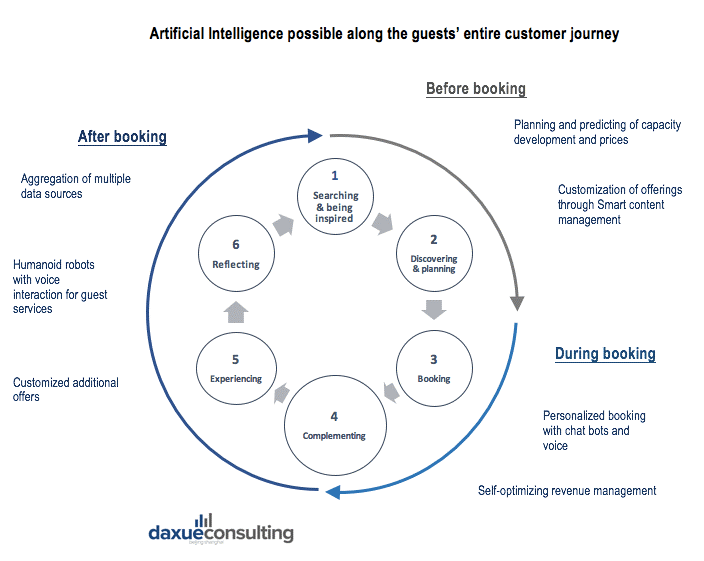
Companies in the hotel industry in China should embrace innovation through the implementation of AI-enabled technology, and partnering with the best AI companies. Alibaba, Baidu, and Tencent, as well as Huawei, are amalgamated AI companies, but there are also plenty of SME AI companies in China that are developing AI technology as well. Implementing AI such as facial recognition, or machine learning devices that power data mining is a source of competitive advantage. The AI Smart room, for example, is undoubtedly attractive for Chinese travelers and is laying the foundations for a new degree of modernization and customer satisfaction.
Hotel companies can also partner with AI companies in China that work separately by basis, technology, or just application. To know more about the existing AI companies in China, please direct to Daxue Consulting’ research in the AI landscape in China here.
Author: Ines Beneyto Brunet





